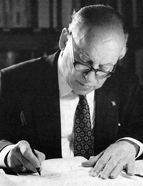

In his innovative work at the Academy, he invited prestigious historians to join, a course of action that would remain constant until 2006, when, after 30 years, he stepped down as president. At the same time, he launched scientific initiatives which, in the first year of his term (1975), resulted in a colloquium on the role of regional areas in the historical formation of Portugal, a favourite field of his research, as he considered their asymmetries to be “living cells of the Portuguese organism” (Ibidem. 31). He had discovered the importance of regional and local history in the research carried out in the archives of southern France. The theme would become a constant feature of his multifaceted studies, which he passed on in seminars at the Faculdade de Letras [School of Arts and Humanities] when he was reinstated as a lecturer and later in the supervision of master’s and doctoral theses. The following year, he organised a colloquium to commemorate the centenary of the death of Alexandre Herculano, which was to take place in 1977, but which he brought forward to October 1976, choosing as its theme Alexandre Herculano à luz do nosso Tempo (Alexandre Herculano in the light of our times), in which he contributed with studies on different facets of the historian. In the same year, he published ‘ Herculano e a consciência do liberalismo português’ (The Marquis of Pombal and the consciousness of Portuguese liberalism) (1977), going on to devote other studies to this figure of the renewal of historiography and 19th-century liberalism, for whom he had felt a genuine fascination since his youth. This is also an example of the special attention he paid to great personalities who embodied periods of change and political debate. Along these lines were the celebrations of the bicentenary of the Marquis of Pombal (1982), to whom he dedicated a colloquium and published the work Marquês de Pombal. O Homem, o Diplomata e o Estadista (Marquês de Pombal: The Man, the Diplomat and the Statesman), a politician representative of the end of the Old Regime, whose governmental measures, inspired by the ideas of the Enlightenment - more pragmatic than theoretical - were precursors of the Liberal Revolution. With the same purpose, he extolled the profile of the last sovereign of Portugal, writing his biography entitled D. Manuel II (1889-1932). The King and the Man in the Light of History (1990), in addition to dedicating other studies to him.
This work is financed by national funds through FCT - Foundation for Science and Technology, I.P, in the scope of the projects UIDB/04311/2020 and UIDP/04311/2020.
